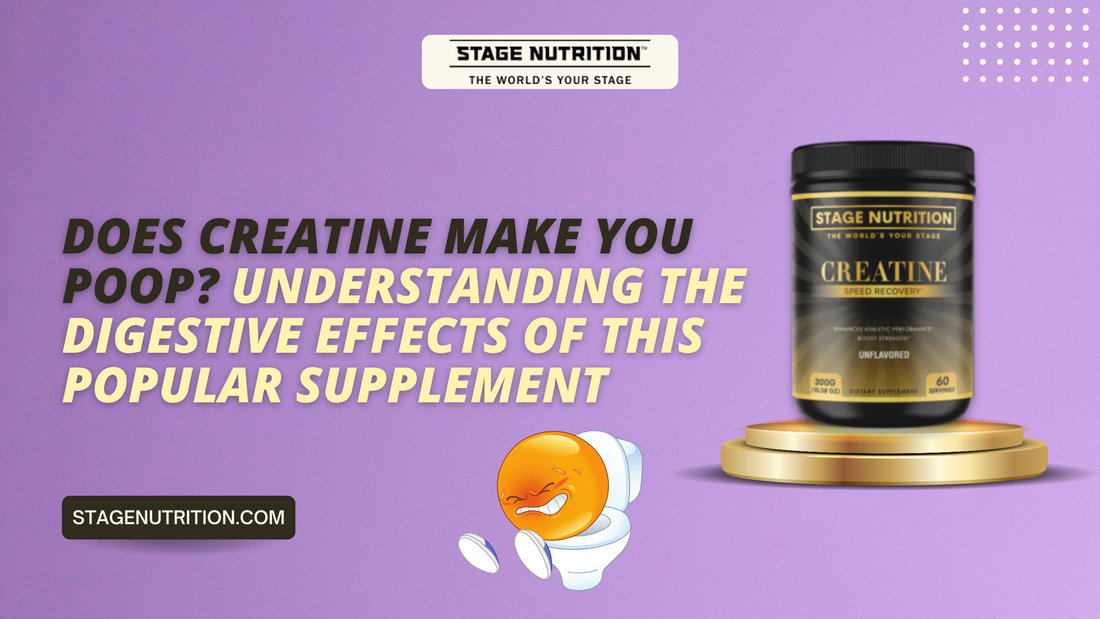A popular supplement, creatine is well-known for its capacity to improve strength, muscular mass, and athletic performance. However, some users report experiencing digestive issues, leading to the one common question: “Does creatine make you poop?”
In this blog, we’ll explore the digestive effects of creatine, potential solutions for those facing issues, and how to determine if creatine is suitable for your body. Further, we will talk about some gentler-on-the-stomach substitutes for creatine.
Does Creatine Make You Poop?
Creatine is generally well-tolerated, but for some individuals, it can cause digestive disturbances, including an increased urge to go to the toilet. We'll go into more detail about some of the elements that may affect this response below.
Is There a Fix if Taking Creatine Is Giving You Digestive Problems?
Experiencing digestive issues after taking creatine can be uncomfortable, but there are several strategies you can try to alleviate these problems:
- Take Smaller Doses of Creatine: Instead of taking a large single dose, try spreading out smaller doses throughout the day. This can reduce the likelihood of overwhelming your digestive system.
- Take Creatine on Its Own Without Food: Consuming creatine without food might help some individuals avoid digestive discomfort. Try taking it at various times to find what suits you the best.
- Ensure Adequate Hydration: Drink plenty of water when taking creatine to help your body process it more effectively and reduce potential gastrointestinal distress.
- Switch Creatine Forms: Some people find that switching from creatine monohydrate to other forms, like creatine hydrochloride (HCL), can reduce digestive issues.
How to Determine Whether Your Body Can Handle Creatine
Take into consideration the following actions to find out if creatine is right for your body:
- Start with a Low Dose: To gauge how your body responds, start with a lower dose than is advised and work your way up.
- Track Your Body's Reaction: After taking creatine, be mindful of any upset stomach you may have. If you notice discomfort, try adjusting the timing, dosage, or form of creatine.
- Speak with a Healthcare expert: For specific guidance on using creatine or if you have any pre-existing digestive issues, speak with a healthcare expert.
Also Read: How Much Water to Drink with Creatine
There Are Some Alternatives to Creatine That Are Digestive-Friendly
If you find that creatine consistently causes digestive issues, you might want to consider some alternatives that are known to be easier on the stomach:- Beta-Alanine: This supplement can help improve exercise performance by buffering acid in muscles, similar to creatine’s effects.
- Branched-Chain Amino Acids (BCAAs): BCAAs can aid muscle recovery and growth without causing digestive discomfort for most people.
- Protein Supplements: High-quality protein supplements can support muscle growth and recovery without the gastrointestinal side effects sometimes associated with creatine.
In What Cases Can Creatine Cause the Urge to Go to the Toilet?
You Always Take Creatine with a Meal
Taking creatine with a meal can sometimes cause digestive issues for some individuals. The combination of creatine and certain foods might not sit well with your stomach, leading to discomfort and the urge to poop.
You Take Creatine with BreakfastFor some people, taking creatine with breakfast, especially if it includes high-fiber foods or dairy, can trigger digestive issues. Experimenting with different meal timings might help alleviate this problem.
You Have Irritable Bowel SyndromeDigestive problems are more common in those with Irritable Bowel Syndrome (IBS) who use supplements, such as creatine. It's critical to pay attention to how your body responds if you have IBS and make any adjustments.
You Take a Large Single Dose of CreatineTaking a large single dose of creatine can overwhelm your digestive system, leading to discomfort and the need to use the toilet. This problem can be lessened by dividing the medication into smaller doses throughout the day.
How Symptoms can be reduced?
Take Smaller Doses of Creatine
Spreading out your creatine intake into smaller doses can help your digestive system process it more comfortably, reducing the risk of gastrointestinal issues.
Take Creatine on Its Own Without Food
Some individuals find relief by taking creatine on an empty stomach or away from meals. Try this method for a while and see if it helps you feel better.
If Serious Gastrointestinal Issues Persist, Cease Use Immediately
It's advisable to quit taking creatine and see a doctor if your gastrointestinal problems are severe or chronic even after trying several treatments.
Final Words on Does Creatine Make You Poop?
While creatine is an effective supplement for many, it can cause digestive issues for some users. By experimenting with dosages, timing, and different forms of creatine, you can often find a method that works for you. If digestive problems persist, consider alternative supplements that are easier on the stomach.
Our Recommended Creatine Supplement

If you're searching for a premium creatine supplement, we suggest checking out our well-regarded offering by Stage Nutrition. Here at Stage Nutrition, your health and well-being come first. Our team of experts is dedicated to providing accurate, reliable information and high-quality supplements that support your fitness goals.
FAQs
Does creatine affect bowel movements?
Yes, in some cases, creatine can affect bowel movements, leading to increased frequency or urgency.
Does creatine go to your belly?
Creatine is absorbed by the muscles, not stored in the belly. However, some users may experience temporary water retention, which can cause bloating.
Does creatine improve digestion?
Creatine is not specifically known to improve digestion, but it supports overall muscle health and performance.
How much water should I drink with creatine?
When using creatine, it is advised to consume 8 to 10 glasses of water a day to ensure enough hydration and lower the risk of gastrointestinal distress.



